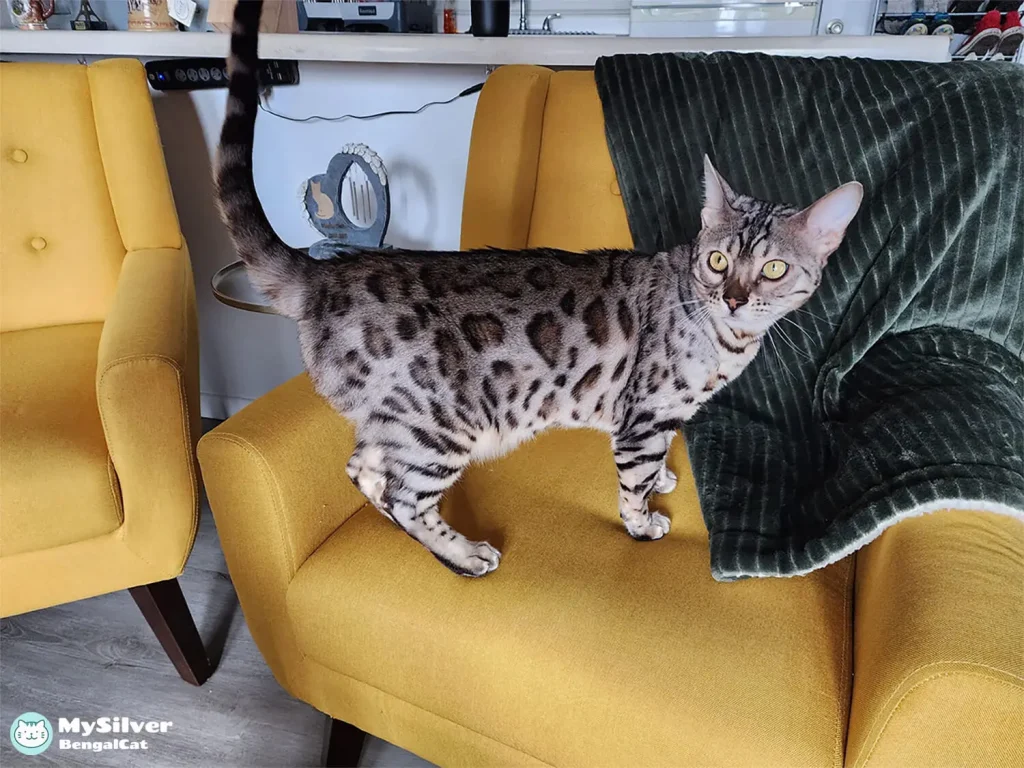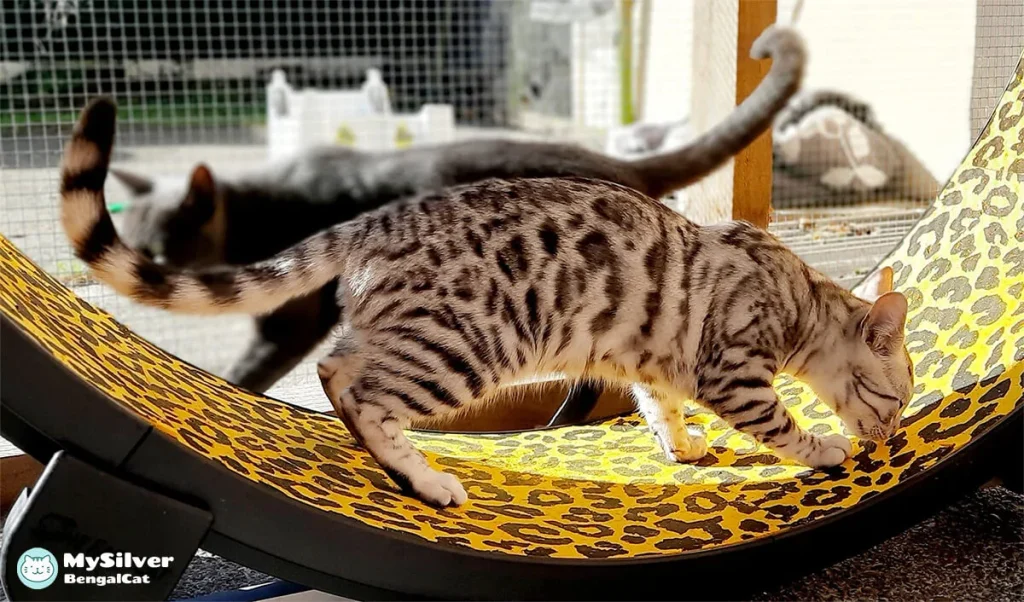Why I Hate My Bengal Cat – Evaluating Potential Challenges

It’s common to hear someone say, “I hate my Bengal cat,” due to the breed’s unique personality traits and potential behavioral issues. In this article, we’ll discuss why Bengal cats may not be the right fit for everyone, despite their popularity for their striking appearance, lively personality, and intelligence.
With unique traits, lifestyle requirements, and potential behavioral issues, weighing the pros and cons before getting a Bengal cat is essential. While they may seem like a gift to the feline world, they can also be Pandora’s box, potentially compromising your peace of mind, freedom, and home decor.
Meet Silver Bengal Cat
A Silver Bengal cat is a breed with a stunning silvery-white coat and bold black markings, resembling a wild leopard. They are playful, intelligent, and have captivating green or blue-green eyes. They make great pets for those who love exotic-looking cats. Learn more about Silver Bengal Cat in detail.
Reasons Which Can Make You Say, ‘’I Hate My Bengal Cat’’
If you need more clarification about the potential challenges of owning a Bengal cat, here are some reasons to reconsider before getting one.
Behavior Issues of Bengal Cats
1. Destructiveness
Say a long, hard goodbye to your furniture, bedsheets, and everything else if you decide to get a Bengal cat despite all the warnings.
Bengal cats are a high-energy, intelligent breed that also quickly becomes bored. Bengals, like children, become destructive when they are bored.

2. Litter Box Issues
A cursory internet search suggests an infection of the urinary tract, kidney issues, or stress as possible causes of Bengal cats peeing outside their litter box. Although these medical conditions may result in mishaps, they are not the primary cause of Bengals using the world as their litter box. Read more about Why Does My Silver Bengal Cat Pees Everywhere?.
3. Separation Anxiety
Bengal cats are unsuitable for those often away from home for long periods. If you work 9-5 and cannot provide proper care and attention for your cat during your absence, Bengal cats are not the right fit for you. These cats can develop separation anxiety, which can cause them to feel fearful and panicked and may result in undesirable behaviors.
Care and Maintenance of Bengals
1. Diet
While Bengal cats have a robust immune system, they still require a balanced diet that contains all essential nutrients for their overall health and growth. However, some inexperienced owners opt for dry food due to its convenience and minimal mess, which can result in dehydration and diarrhea. Read more information on feeding guidelines for Bengal cats.
2. Exercise
Bengal cats require regular exercise and physical activity due to potential health issues. For example, if you prefer to spend your weekends lounging on the couch and binge-watching Netflix, a Bengal cat may not be the best fit for you.

3. Then Grooming
While Bengal cats are a shorthair breed that requires minimal grooming, the necessary grooming tasks can be challenging to manage. For example, their coats need specific supplements and cannot be washed with regular shampoo. Dental care is also essential for their overall health; therefore, the list of necessary grooming tasks can be lengthy.
4. Space
Bengal cats are not recommended for small apartment owners. They are not, in fact, the cat who will live contentedly with you in your tiny home. Bengals enjoy running around and climbing on things.
Personality Traits Of Bengal Cats
1. High energy and playfulness
A Bengal cat might be your worst nightmare if you prefer a relaxed, unassuming companion. Bengal cats have the most energy of any breed of cat in existence. Bengals, especially kittens, might even compete with toddlers who have consumed a cup of pure sugar.
They enjoy playing, getting people’s attention, and pestering them until they give them all of their attention. Their energy doesn’t run out as they get older.
2. Attention-seeking behavior
Unlike most of their feline counterparts, Bengals adore being the center of attention. They enjoy playing with you, rubbing themselves against you, and occupying your time while you go about your day.
The fact is that most people choose to get cats as pets because they require less upkeep than other animals like dogs. So avoid Bengals if your primary goal in getting a cat is to maintain your independence and that of your feline companion.
‘’If you prefer to spend your weekends lounging on the couch and binge-watching Netflix, then a Bengal cat may not be the best fit for you’’
3. Vocalization
Bengal cats are known for being noisy and think their owners are somewhat amused by their constant babbling; Bengals can make a terrible pair because of their loud personalities and desire for attention.
If your Bengal needs attention, no matter what you’re doing, or how busy you are, they’ll force you to spend time with them.at any cost. Yes, you heard us right.
4. Training Challenge
Cats aren’t mainly known for their listening skills in general, but Bengals seem to have even more selective hearing than other cats. There is little chance that your Bengal will listen or care if you scream, shout, or call out as loud as you like. But, no matter the situation, Bengals will quickly become uncontrollable, and only possible to reason with the proper, consistently reinforced training.
That’s not to say you can’t train your Bengal cat to behave; it just means it will take as much work as trying to get a teenager to pay attention to anything you say.
Bengals Cats Cost Consideration
- Purchase Price: Bengals are known to come with a hefty price tag, which is no surprise given the breeding practices involved in producing them. Their unique coat patterns and color variations further justify the cost of adoption.
- Medical Expenses: According to the American Veterinary Medical Association, a Bengal cat’s routine check-up exam costs around $50-$250. However, the cost of veterinary care for Bengal cats can change based on location, services offered, and the cat’s health.
- Food And Supplies: As previously mentioned, Bengal cats require more than just packaged dry food. They benefit from a healthy diet that may include raw meat. This dietary requirement can add to the cost of owning a Bengal cat.
Conclusion
Bengal cats require careful consideration and commitment from their owners due to their high energy, attention-seeking behavior, and potential health and behavioral issues.
Before bringing a Bengal cat into your home, it’s essential to assess your living space, lifestyle, and budget, research the breed, and consult with reputable breeders or rescue organizations.
FAQs






